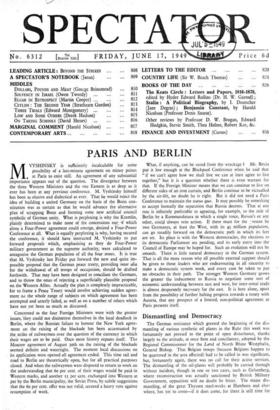PARIS AND BERLIN
MVYSHINSKY is sufficiently incalculable for some possibility of a last-minute agreement on minor points . at Paris to exist still. An agreement of any substantial importance appears out of the question. The divergence between the three Western Ministers and the one Eastern is as deep as it ever has been at any previous conference. M. Vyshinsky himself has been as elusive and dialectical as ever. That he would reject the idea of building a united Germany on the basis of the Bonn con- stitution was as certain as that he would advance the alternative plan of scrapping Bonn and forming some new artificial council symbolic of German unity. What is perplexing is why the Kremlin, plainly determined to make none of the concessions outs -4 which alone a Four-Power agreement could emerge, desired a Four-Power Conference at all. What is equally perplexing is why, having secured the conference, it should have instructed M. Vyshinsky to put forward proposals which, emphasising as they do Four-Power military government as the supreme authority, were calculated to antagonise the German population of all the four zones. It is true that M. Vyshinsky last Friday put forward the new and quite im- possible proposal that the German peace treaty, providing inter alia for the withdrawal of all troops of occupation, should be drafted forthwith. That may have been designed to conciliate the Germans, and to throw the onus of rejecting a superficially plausible proposal on the Western Allies. Actually the plan is completely impracticable, for to frame a Peace Treaty would involve achieving sudden agree- ment cm the whole range of subjects on which agreement has been attempted and utterly failed, as well as on a number of others which have not yet been so much as discussed.
Concerned as the four Foreign Ministers were with the greater issues, 'they could not disinterest themselves in the local deadlock in Berlin, where the Russian failure to honour the New York agree- ment on the raising of the blockade has been accentuated by the strike of railwaymen over the question of the currency in which their wages are to be paid. Once more history repeats itself. The Moscow agreement of August 3oth on the raising of the blockade seemed definite and watertight. The moment local discussions on its application were opened all agreement ended. This time rail and road to Berlin are theoretically open, but for all practical purposes closed. And when the railwaymen were disposed to return to work on the understanding that 6o per cent. of their wages would be paid•in Western marks, and another 15 per cent. exchanged into Western at par by the Berlin municipality, the Soviet Press, by subtle suggestions that the 6o per cent. offer was not valid, secured a heavy vote against resumption of work.
What, if anything, can be saved from the wreckage ? Mr. Bevin put it low enough at the Blackpool Conference when he said that " if we can't agree how we shall live we can at least agree to live together," but it is a question whether there is even warrant for that. If the Foreign Minister means that we can continue to live on different sides of an iron curtain, and Berlin continue to be victualled by the air-lift, no doubt he is right. But it did not need a Paris Conference to maintain the status quo. It may possibly be something to accept formally the separation that Russia decrees. That at any rate is infinitely preferable to agreeing, for example, to the rule of Berlin by a Kommandatura in which a single voice, Russia's or any other, could always veto action. If there must for the :resent be two Germanys, at least the West, with its 45 million population, can go steadily forward on the democratic path in which its feet are set. Its place is with the Western democracies, the elections to its democratic Parliament are pending, and its early entry into the Council of Europe may be hoped for. Such an evolution will net be smooth. There is little natural democracy in the German system. That is all the more reason why all possible external support should be given to those leaders who are endeavouring in all sincerity to make a democratic system work, and every care be taken to put no obstacles in their path. The stronger Western Germany grows the greater the inducement to Russia to negotiate some sort of economic understanding between east and west, for inter-zonal trade is almost desperately necessary for the east. It is here alone, apart from the possibility of further halting progress towards a treaty with Austria, that any prospect of a limited, non-political agreement at Paris presents itself.






































